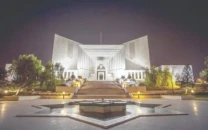Imran fails to get IHC relief
ECP counsel to complete his arguments today

The PTI’s incarcerated chairman, Imran Khan, could not get an immediate relief at the Islamabad High Court (IHC) on Thursday as the court did not suspend an order of a trial court that sentenced him to three years in prison for making inaccurate declarations about his assets and liabilities.
A day earlier, a Supreme Court bench had raised questions about the verdict issued by Additional Sessions Judge (ASJ) Humayun Dilawar on August 5, noting that prima facie there were serious defects in the trial court’s verdict.
The SC had, however, observed that it would wait for the IHC to issue a verdict on a petition filed by the former prime minister against the trial court’s order and on Thursday an IHC division bench led by Chief Justice Aamer Farooq and comprising Justice Tariq Mahmood Jahangiri took up Imran’s plea.
During the hearing, Imran’s lead counsel Latif Khosa argued that Imran Khan’s sentence should be immediately suspended based on three grounds: An unauthorized filing of the complaint; non-jurisdiction of the court; and the fact that Imran is sentenced to only three years of imprisonment.
Khosa said under the Election Act, 2017, the Election Commission of Pakistan (ECP) has the power to file a complaint against a lawmaker and that powers lie with the chief election commissioner (CEC) and ECP’s four provincial members.
“Both the CEC and the four ECP members are authorized to file a complaint and they can authorize the ECP secretary to lodge a complaint [on their behalf]. However, in this case, even the secretary did not file the complaint against Imran. Rather it was filed by a district election commissioner.”
Read CJ calls into question Toshakhana verdict
He said another objection is that the ECP complaint was not filed correctly at the proper forum. “A complaint cannot go directly to a sessions court judge; the procedure in the law dictates that the complaint must first be filed to a magistrate as a sessions judge cannot directly hear a complaint.”
Referring to various decisions of the Supreme Court, he said a complaint goes to a magistrate first. The magistrate then refers it to a sessions court. “We are not challenging the trial itself. The sessions court will conduct the trial but it cannot do so directly.”
He said Imran Khan was sentenced to only three-years in prison. This sentence was further reduced to 2.5 years after the President of Pakistan pardoned the prisoners' six-month sentence on August 14. “”The PTI chairman's six-month sentence has been pardoned,” he added.
The PTI chief’s counsel also highlighted various defects in the trial court’s order. He said the trial court did not allow the PTI chief to present witnesses in his defense; issued the order despite the fact that the matter was pending with the IHC and ignored the IHC’s orders.
“The ASJ completely disregarded your instructions. We provided a list of witnesses for our defense, but the court deemed the witnesses irrelevant without even reviewing the list,” Khosa said.
He said the IHC on August 4 held that the trial court’s decision to declare the Toshakhana case admissible was illegal.
It had ordered the lower court to hear the PTI chief’s plea against maintainability of the case “afresh”. “However, the trial court convicted Imran Khan on August 5 while completely ignoring the IHC order.”
Khosa explained the reason why the PTI chief’s lead counsel Khawaja Haris arrived late at the sessions court on August 5.
When the trial court resumed hearing the case on August 5, Imran’s lead counsel did not show up. The trial court judge had called the PTI’s counsel four times between 8:35am to 12noon.
Read More ATC allows Imran’s arrest in Jinnah House rioting
However, when "no one" appeared on behalf of the accused for argument, the court reserved its verdict. At 12:30pm, the trial court judge unveiled his order. Referring to the IHC order, the court had observed that it was dismissing the PTI chief’s petition against maintainability of the ECP complaint as “nobody argued the application filed by the accused questioning maintainability of the complaint”.
Khosa said in the morning of August 5, some people tried to abduct Khawaja Haris's clerk.
“Khawaja Haris wrote a request to the Chief Justice of the Supreme Court and informed him about the matter. At 12 o'clock, Khawaja Sahib arrived at the trial court. However, the judge told him that now his presence was not required.
“At 12:30, the judge, in a brief order, pronounced a three-year sentence. At 12:35, it was discovered that Lahore police had arrived at Imran Khan’s residence. Imran had been arrested five minutes after the verdict,” he said.
ECP’s counsel Amjad Pervaiz in his arguments said the case was not about tax evasion rather it was about submission of fake declaration of assets and liabilities.
He said the accused in statement under section 342 mentioned that he wanted to present witnesses in his defense. This implies that the accused had conceded that the prosecution had proven its case, and now he intended to present witnesses in his defense.
“The accused should have provided the information himself on the ECP's form B, rather than relying on an accountant or tax consultant. This is a case of incorrect declaration,” he said.
The court was later adjourned. The ECP’s counsel will conclude his arguments today [Friday].



















COMMENTS
Comments are moderated and generally will be posted if they are on-topic and not abusive.
For more information, please see our Comments FAQ